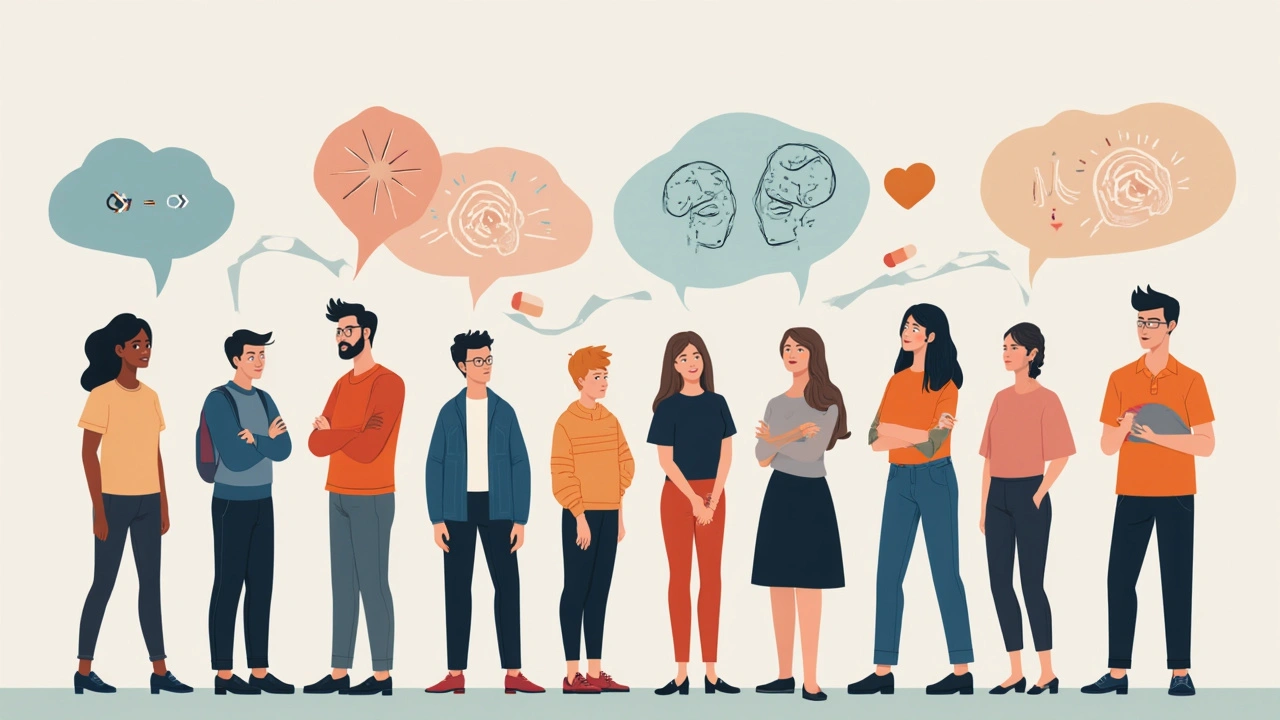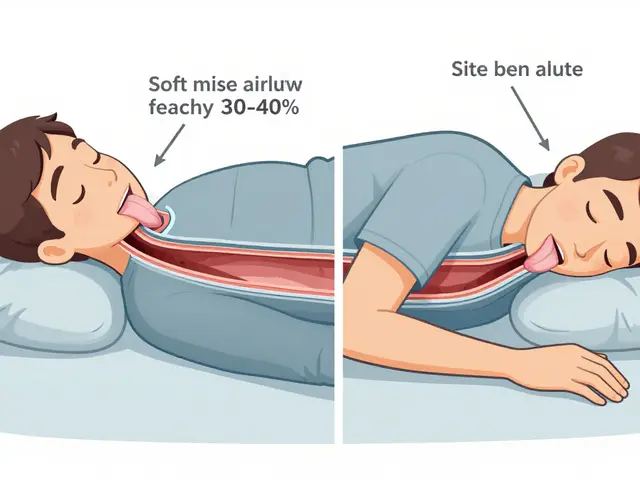Ask ten people about antidepressants and you'll hear ten different stories. But bring up Zoloft, and almost everyone either knows someone who takes it or has seen it flashed across a TV ad. This tiny pill has shaped millions of lives since it landed on pharmacy shelves. But how does it actually work—and what should you really expect if your doctor pulls out the prescription pad?
How Zoloft Works: The Science and the Buzz
Let’s talk about brain chemistry, but don’t worry, I’ll keep it simple. Zoloft is the brand name for sertraline, a selective serotonin reuptake inhibitor (SSRI). No, you don’t need a biochem degree to get what that means. Basically, your brain uses a chemical called serotonin to help regulate your mood. People with depression, anxiety, or both tend to have lower serotonin activity, so things feel heavier or out of control.
Zoloft’s job? It blocks your brain from vacuuming up serotonin too quickly. With more serotonin floating around, your mood might brighten, you could get better sleep, and those constant worries may finally hit pause. Zoloft was first approved by the FDA for depression back in 1991, which means doctors have more than 30 years of experience watching how it works in all kinds of people.
But here’s a fact a lot of folks miss: Zoloft works differently for everyone. Some people feel better in a week or two, others need a month or more. Your genes, your stress levels, even your diet can tweak how sertraline acts in your brain. That’s why psychiatrists often say, “Be patient, but let’s check in regularly.” And it’s not just for depression—Zoloft is one of the first SSRIs approved for obsessive-compulsive disorder (OCD), panic disorder, post-traumatic stress disorder (PTSD), premenstrual dysphoric disorder (PMDD), and even social anxiety.
Think about that: one prescription, used across a massive range of mental health issues. Not every SSRI can say the same. Around 38 million prescriptions for sertraline were given out in the US in 2023, according to a national pharmacy tracker. That kind of number isn’t just a blip; it means doctors think Zoloft matters in an age when anxiety and depression top health charts.
So, why might Zoloft work where other meds don’t? It mainly targets serotonin, but newer research suggests it may also have mild effects on dopamine—the "reward" chemical. That combination helps explain why some patients report feeling energized or more motivated, aside from just "not sad." Still, if you’re hoping for instant joy, slow down. SSRIs aren’t magic stress erasers; they gently lift the chemical fog so you can do the real-life work of healing.
What Zoloft Really Feels Like: Benefits and Everyday Changes
People love to analyze their first couple weeks on Zoloft. Some swear their anxiety vanishes, while others notice nothing but a dry mouth or a little nausea. If there’s one thing you should know: your own reaction probably won’t match your neighbor’s or that random Reddit thread. Doctors usually kick things off at a low dose—often 25mg or 50mg once daily—then slowly ramp up based on how you feel. Why the slow roll? Going up too fast can mean nastier side effects, and the body needs time to get used to the drug’s rhythm.
The classic "Zoloft start-up" comes with its own set of quirks. You might feel a bit jittery, tired, or slightly out of it in the beginning. Sleep can go haywire or suddenly get much better. The most common benefit is that gnawing sense of dread—the kind that knocks the wind out of you before a phone call—starts to fade. Not gone overnight, just quieter. People with depression often say their energy creeps back, little by little. Maybe you laugh at a joke you’d usually ignore or have the motivation to shower instead of Netflix-binging in sweatpants.
But here’s the odd part: some notice they get more anxious for the first few days, not less. It’s a weird paradox. Research shows this happens to about 1 in 10 new Zoloft users. If that’s you, doctors recommend sticking it out if you can, as these jitters often go away. If they linger or get worse, don’t tough it out alone—call your doc.
Another under-the-radar change is emotional "numbing." You might find you can’t cry at sad movies or feel passionate about things you used to love. For some, this is a huge relief; for others, it’s frustrating. It’s a tradeoff only you can judge. About a third of people on SSRIs notice some blunting, but most stick with the med because their symptoms are still much easier to handle than before.
If you’re into numbers, check this out: in a 12-week clinical trial of nearly 2,000 folks with major depression, about 57% reported a significant drop in symptoms on sertraline.* But here’s the real-life rub—not everyone hits that jackpot. That’s why mental health isn’t one-size-fits-all, and why some folks try two or three different medications before landing on what works.
| Duration on Zoloft | Percentage Reporting Symptom Improvement |
|---|---|
| 2 weeks | 31% |
| 4 weeks | 45% |
| 12 weeks | 57% |
Getting the most out of Zoloft isn’t about hoping for immediate fireworks. People tend to notice smaller, day-to-day boosts—less overthinking, more stable mood, fewer physical stress symptoms. And, truthfully, those small changes add up. Your best move? Keep a simple journal. Track your mood, sleep, and side effects for each week. This gives you and your doctor a clear map of whether Zoloft is really helping—or if it’s time to tweak the plan.

Not Just the Fine Print: Zoloft Side Effects You Actually Feel
No sugarcoating here: every medication has its downsides, and Zoloft is no exception. The most common side effects pop up early, usually in the first few days or weeks. We’re talking headaches, dry mouth, diarrhea, nausea, or sleep changes—nothing dramatic, but enough to make you wonder if it’s worth it. Most people find these mild and temporary, fading as their body adjusts. But every list of zoloft side effects hides a few things that deserve a spotlight.
Here’s the big one: sexual side effects. This can mean lower sex drive, trouble reaching orgasm, or erectile dysfunction. Doctors estimate up to 50% of SSRI users experience some change in their sex life, even if they don’t want to talk about it openly. If this becomes an issue, don’t just suffer through—your doctor can adjust your dose or suggest different strategies. Some even switch to meds like bupropion to help restore function.
Another side effect that doesn’t get enough airtime is weight fluctuation. Zoloft is considered more “weight-neutral” than some other antidepressants, but a small group—especially women—report mild weight gain (an average of 4-6 pounds after six months). A few folks see the opposite and actually lose weight, particularly if anxiety made them stress-eat before.
People with sensitive guts sometimes deal with ongoing stomachaches or diarrhea. This is your digestive system adjusting to the increase in serotonin, which isn’t just in your brain—it’s in your GI tract, too. Pro tip: taking Zoloft with food or at night cuts the odds of these issues. If you have pre-existing digestive troubles, flag them for your prescriber before you start.
Then there are rare but serious risks: Zoloft can raise your risk of suicidal thoughts, particularly if you’re under 25. This isn’t to scare you; it’s just data from close FDA monitoring. If you notice any sudden changes in mood, self-harm thoughts, or manic behavior, reach out to a professional immediately.
And don’t forget weird reactions—some people report vivid dreams, jaw clenching, or night sweats. These might seem odd, but they’re all logged in the post-launch safety reports. If you’re someone who thrives on details, check out the official medication guide for a full list. Just remember: not every user gets every side effect, and most are short-lived.
Starting, Stopping, and Switching: Tips for the Zoloft Journey
If you’re thinking about starting Zoloft, or you’re already on it but debating a change, start with honest conversations. The golden rule: don’t decide on your own. When you start, doses kick off low and build up—this minimizes side effects. Try to take it at the same time each day for the most steady effect, and set a reminder on your phone if you’re forgetful like me.
Zoloft isn’t the fast-food drive-thru of antidepressants. You can wait a few weeks before judging whether it’s working. During this stretch, stay in touch with your doctor and don’t ghost your appointments. Even missing one or two pills usually isn’t a big deal, but don’t make a habit of it. If you suddenly stop after steady use, you risk "SSRI discontinuation syndrome." Fancy name, annoying symptoms—dizziness, brain zaps (they feel like little shocks in your head), irritability, or even nausea. That’s why the experts always say to taper off Zoloft slowly if you need to quit or switch to something else.
Mixing Zoloft with alcohol is a hotly debated topic. Technically, it’s not forbidden, but alcohol can worsen depression, fatigue, or side effects like dizziness. You don’t have to cut it out forever, but moderation is key. If you drink a lot, be upfront. Your liver helps process both drugs and alcohol; overloading it can turn a manageable side effect into something more serious.
Keep an eye on drug interactions, too. If you’re on other prescription meds, over-the-counter allergy pills, or herbal supplements (like St. John's Wort), let your doctor know. Some combos can mess with your brain chemistry or spark unwanted reactions. And for those wondering about birth control—no, Zoloft won’t make your pill less effective, but talk to your provider if you have questions about pregnancy or breastfeeding.
- Set yourself a calendar reminder for your daily dose.
- Track side effects in a simple notebook or phone app.
- Stick to your follow-up appointments, even if you feel better.
- Be honest about alcohol, other meds, or supplements.
- If you want to stop, always taper with your doctor’s help.
Switching antidepressants isn’t like flipping a light switch. Sometimes you’ll overlap the old and new drugs for a few days, under your doctor’s orders. Sometimes there’s a "washout" period to clear the old one from your system. If you’re moving from Zoloft to a different SSRI or to a totally different class (like SNRIs or MAOIs), expect a custom plan—it’s not one-size-fits-all.

Living with Zoloft: Real Stories, Myths, and What to Ask Your Doctor
You’ll hear horror stories about Zoloft withdrawals on forums and see glowing reviews on TikTok. The truth lands somewhere in between. Some folks get their lives back; others never quite click with this med. But the stigma about needing medication for your mood? That’s ancient history to anyone who’s seen a friend crawl out of a mental fog after months of struggle.
Still, there are myths to bust. You won’t turn into a zombie overnight, nor will you become "addicted" in the classic sense—SSRIs don’t produce a high, and you don’t need to keep upping the dose to get the same mood boost. If you stop suddenly, you might have withdrawal symptoms, but that’s not addiction. Most people who take Zoloft won’t be on it forever, either. Current guidelines suggest sticking with it for at least 6-12 months after you start feeling better, then reassessing with your doctor. Some stay on for years, others taper off after one healthy stretch.
Curious how you’ll tell if it’s working? The gold standard is this: are your symptoms better, or at least more manageable, than they were a month ago? Can you function at work, handle stress at home, and enjoy a few things again? If the answer is no after a couple months, speak up. There’s zero shame in adjusting your treatment. The goal is a life you can actually enjoy, not just one you can survive.
Before your next doctor visit, jot down any lingering symptoms, side effects, or big life changes. Don’t be shy—doctors appreciate honest feedback. Ask about how to manage sexual side effects, weight concerns, or how Zoloft will mesh with your other health issues. And if cost is a worry, ask about generics; sertraline is as effective as brand-name Zoloft for most.
If you’re looking for community, the internet is full of support groups and success stories. Yet, nothing beats a real conversation with your prescriber, mental health therapist, or even an understanding friend or partner. Remember, the real strength isn’t just starting Zoloft—it’s sticking with your plan, tracking what works, and speaking up when it doesn’t.
*JAMA Psychiatry, "Efficacy and tolerability of sertraline for major depressive disorder in adults" study, 2021.







12 Comments
Rachael Turner
When you think about mood as a tide you realize that medication is only a buoy, not the ocean itself.
Zoloft can lift the water just enough to keep you from drowning, but the current still needs you to navigate.
The brain chemistry shifts slowly, like sunrise over a still lake, and patience becomes a quiet practice.
Everyone’s story ripples differently, so sharing what you feel can map the subtle changes.
Keep a simple journal, note the moments when the fog thins, and let the data speak louder than the hype.
Suryadevan Vasu
The onset of Zoloft can feel like a subtle shift in baseline mood.
Vin Alls
Zoloft, known chemically as sertraline, is a cornerstone in the modern pharmacopeia of mood disorders.
Its mechanism, a selective blockade of serotonin reuptake, creates a cascade that ripples through neural pathways.
When serotonin hangs around longer in the synaptic cleft, receptors receive a richer, more sustained dialogue.
Patients often report a gentle lifting of the emotional weight rather than an electric surge of happiness.
The timeline for noticing these effects usually spans from one to three weeks, although individual variability can stretch this window.
Genetic polymorphisms in the CYP450 enzymes can accelerate or decelerate the drug’s metabolism, meaning two people on the same dose may experience wildly different plasma levels.
Dietary factors, such as excessive caffeine or high‑fat meals, can further modulate absorption rates.
Clinicians typically start at 25 mg or 50 mg per day to temper the initial jittery sensations that some users encounter.
A gradual titration, adding 25–50 mg increments every one to two weeks, balances efficacy with tolerability.
Common side effects-dry mouth, mild nausea, occasional insomnia-often fade as homeostasis re‑establishes.
More nuanced changes, like a blunted emotional range, can be both a blessing and a burden, prompting discussions about quality of life versus symptom relief.
Sexual dysfunction remains a frequent complaint, affecting up to half of users, and may warrant adjunctive strategies or a medication switch.
Weight trajectories on sertraline are generally neutral, yet a subset of patients notice a modest gain or loss, underscoring the importance of monitoring.
Rare but serious adverse events, such as increased suicidal ideation in younger adults, demand vigilant follow‑up.
When discontinuing, a tapering schedule mitigates the dreaded brain‑zap phenomenon, allowing neural circuits to readjust without shock.
Overall, Zoloft offers a versatile tool in the therapeutic arsenal, but success hinges on personalized dosing, open communication, and a willingness to ride the gradual tide toward steadier moods.
Tiffany Davis
I’ve found that setting a consistent time for the dose helps smooth out the daily fluctuations.
Tracking sleep quality alongside mood can reveal patterns that are otherwise invisible.
If side effects linger beyond the first few weeks, a brief conversation with the prescriber is advisable.
The goal is steady improvement, not a rapid miracle.
Don Goodman-Wilson
So you think a tiny pill will magically erase all the darkness?
Spoiler: most people need therapy, lifestyle tweaks, and a bit of grit.
Anything less is just a convenient excuse to avoid real work.
Bret Toadabush
They don't tell you that big pharma rigs the studies so everyone stays hooked on the same brand.
The FDA is just a puppet and the side effect list is filtered to protect the profits.
Trust the whistleblowers, not the glossy ads.
Diane Thurman
While some conspiracys sound scary, the real data shows Zoloft is one of the safest SSRIs on the market.
Overstating the risk can scare patients away from a therapy that could help them.
Keep the facts straight and the fear out of the conversation.
Iris Joy
Starting a new medication can feel like stepping onto an unfamiliar trail, but you’re not walking alone.
Keep a simple log of mood, sleep, and any odd sensations; patterns will emerge over days and weeks.
Celebrate the small wins, like a night of uninterrupted sleep or a smile that feels genuine.
If something feels off, reach out to your clinician-you deserve a treatment plan that fits you.
Remember, progress is a marathon, not a sprint.
Sarah Riley
Zoloft’s pharmacodynamics involve serotonin transporter inhibition, leading to downstream neuroplastic modulation.
Adverse event profiles are dose‑dependent, with a prevalence curve peaking at 4–6 weeks.
Clinicians should employ a risk‑benefit matrix when titrating beyond 100 mg.
Tammy Sinz
When constructing the risk‑benefit matrix, incorporate patient‑reported outcome measures to capture subjective tolerability beyond the raw side‑effect incidence.
This ensures the titration strategy aligns with individual lived experience.
Christa Wilson
Stay hopeful, the right dose can bring sunshine back! 🌞💪
John Connolly
Your optimism is a powerful catalyst; keep communicating with your healthcare team and you’ll navigate the adjustment period with confidence.